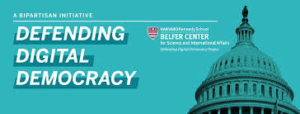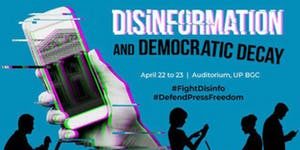Is disinformation drowning democracy?
Former privacy tsars and technology experts have warned the major political parties they must dramatically strengthen their cybersecurity to protect the growing mountains of private data gathered on voters that could be used by foreign adversaries to manipulate elections, David Wroe writes for the Sydney Morning Herald.
“More than two months since the Morrison government revealed that the three major parties had all been victims of a cyber attack early in the year, the Liberal, Labor and National parties have provided scant detail on how they were affected, nor what they have done to improve their defences,” he adds.
 A nonprofit corporation called Defending Digital Campaigns, that would rely partly on volunteer services from cybersecurity professionals, has emerged out of an initiative at Harvard University’s Belfer Center called Defending Digital Democracy, The Washington Post reports.
A nonprofit corporation called Defending Digital Campaigns, that would rely partly on volunteer services from cybersecurity professionals, has emerged out of an initiative at Harvard University’s Belfer Center called Defending Digital Democracy, The Washington Post reports.
When the Berlin Wall fell and the Soviet Union collapsed, it was heralded as the “end of history” — the final triumph of liberal democracy over other political and economic systems and the vindication of the American way of life, notes Ben Sasse, a Republican U.S. senator from Nebraska.
 But the “end of history” has come to an end. The world is returning to the great power competition that for so long defined international relations. The contours of the era in which America now finds itself become clearer by the day, but American foreign policy is suffering from a failure of imagination, he writes for the Texas National Security Review. One potential step toward readiness to meet the challenges of the next century’s great power competition would be to establish a Hybrid Threat Center, adds Sasse, a board member of the National Endowment for Democracy:
But the “end of history” has come to an end. The world is returning to the great power competition that for so long defined international relations. The contours of the era in which America now finds itself become clearer by the day, but American foreign policy is suffering from a failure of imagination, he writes for the Texas National Security Review. One potential step toward readiness to meet the challenges of the next century’s great power competition would be to establish a Hybrid Threat Center, adds Sasse, a board member of the National Endowment for Democracy:
Like the National Counter Terrorism Center, the Hybrid Threat Center would bring together experts from across different domains in the intelligence community — cyber, finance, info-ops, and more — to provide policymakers with an aggregated view of how China and Russia in particular, but also North Korea and Iran, are using asymmetric tools to influence the United States and undercut U.S. interests — including in domains that typically are not seen as political…….For years, the United States has only reacted to a combination of cyber and information operations. That is unsustainable. America must be on defense and on offense.
“To that end, the U.S. government should make better, more robust use of organizations like the U.S. Agency for Global Media and establish some sort of political-warfare agency that can serve as a coordinating hub for American offensive activities and information operations across the globe,” he adds.
Election influence campaigns operate on multiple fronts, according to Liisa Past, former Chief Research Officer at the Cyber Security Branch of the Estonian Information System Authority.
 “It really illustrates the adversarial activity, which is that they’re throwing spaghetti at the walls,” said Past. “Cyber is one wall, misinformation, disinformation and social media is another wall. We’re having to assume that using proxies and…useful idiots is another wall and I’m afraid that behind it there might also be an element of blackmail and personal manipulation.”
“It really illustrates the adversarial activity, which is that they’re throwing spaghetti at the walls,” said Past. “Cyber is one wall, misinformation, disinformation and social media is another wall. We’re having to assume that using proxies and…useful idiots is another wall and I’m afraid that behind it there might also be an element of blackmail and personal manipulation.”
It’s time to conceptualize the “information operations kill chain,” says security technologist Bruce Schneier, a fellow at Harvard’s Berkman-Klein Center for Internet and Society. Information attacks against democracies, whether they’re attempts to polarize political processes or to increase mistrust in social institutions, also involve a series of steps. And enumerating those steps will clarify possibilities for defense, he writes for Lawfare:
Step 1: Find the cracks in the fabric of society—the social, demographic, economic and ethnic divisions.
Step 2: Seed distortion by creating alternative narratives. In the 1980s, this was a single “big lie,” but today it is more about many contradictory alternative truths—a “firehose of falsehood”—that distorts the political debate.
Step 3: Wrap those narratives in kernels of truth. A core of fact helps the falsities spread.
Step 4: (This step is new.) Build audiences, either by directly controlling a platform (like RT) or by cultivating relationships with people who will be receptive to those narratives.
Step 5: Conceal your hand; make it seem as if the stories came from somewhere else.
Step 6: Cultivate “useful idiots” who believe and amplify the narratives. Encourage them to take positions even more extreme than they would otherwise.
Step 7: Deny involvement, even if the truth is obvious.
Step 8: Play the long game. Strive for long-term impact over immediate impact.
PBS’s Judy Woodruff (below) asks former Homeland Security official Juliette Kayyem and Thomas Rid, author of a forthcoming book on influence campaigns, about what has and hasn’t been done to counter Russia’s election interference.

CSIS
Because the Russians know the playbook,” said Kayyem. “And they will change. And so one of my biggest concerns coming from the — you know, both the cyber and physical security space is that the Russians will utilize cyberattacks to have a physical impact on the voting process….. The Russians are sophisticated enough to do that.”
There is “a really serious risk” that the legitimacy of an election is called into question by a Russian operation “that would provide some sort of credible evidence to this claim that the system is rigged in the heat of the moment on election night and the following days to sow doubt and create uncertainty in a very fragile moment, and thus endanger a peaceful transition of power,” says Rid, author of Active Measures: A History of Disinformation (above).
“But by overstating the threat — and we are overstating the full spectrum of Russian influence operations in 2016 currently — by exaggerating the threats, we are effectively making that operation more successful than it actually was,” he adds. “And we risk, by overstating disinformation, we risk engaging in disinformation.”
 The CSIS’s Defending Democratic Institutions (DDI) project, in collaboration with the American Bar Association’s Standing Committee on Law and National Security, invites you to join the launch of its newest report Beyond the Ballot: How the Kremlin Works to Undermine the U.S. Justice System (above). This report explores the ways in which Russia has used disinformation to weaken democracies, and will shine a light on how these attacks, and potentially attacks by others, uniquely threaten public trust in institutions of justice in the United States.
The CSIS’s Defending Democratic Institutions (DDI) project, in collaboration with the American Bar Association’s Standing Committee on Law and National Security, invites you to join the launch of its newest report Beyond the Ballot: How the Kremlin Works to Undermine the U.S. Justice System (above). This report explores the ways in which Russia has used disinformation to weaken democracies, and will shine a light on how these attacks, and potentially attacks by others, uniquely threaten public trust in institutions of justice in the United States.
Wednesday, May 1, 2019 3:00 pm – 6:00 pm
CSIS Headquarters, 2nd Floor







